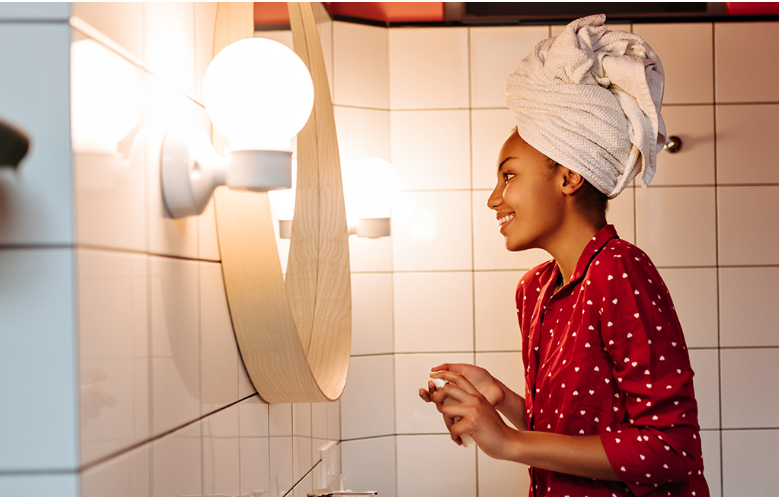
The clock strikes midnight and you’re still lying wide awake in bed. You toss and turn, hoping to find a comfortable position that will carry you into a deep slumber, but the gnawing thoughts and stresses of the past and future continue to infiltrate your mind and tighten your body.
Nothing quite feels worse than struggling to fall asleep at night. Fortunately, calming and well-planned night routines can help relax your body and mind so that you can drift off into a peaceful sleep.
The Importance of a Calming Night Routine
After a long day, likely filled with stressors, it’s essential to take time to unwind and recharge. Specifically, prioritizing relaxation can help you transition into a state of restfulness and fall asleep more easily. It can also help to lower levels of cortisol, a type of stress hormone. This helps promote the release of melatonin, the hormone responsible for regulating our circadian rhythms.
Further, a consistent nighttime routine can provide a sense of stability and predictability and improve sleep quality and duration, leading to better overall health and cognitive function. Not to mention, incorporating self-care practices into your night routine, such as your night skincare routine or journaling, allows you to prioritize your needs and foster a deeper connection with yourself.
How to Optimize Your Night Routine For Quality Sleep
A calming night routine sets the stage for a peaceful transition from the busyness of the day to a good night's sleep, ensuring you wake up refreshed and ready to tackle whatever lies ahead.
To enhance your sleep quality, we’re offering a few helpful tips.
#1 Say “No” To Screen Time
Many of us find ourselves watching our favorite T.V. shows or scrolling through funny videos on our phones before bed. While these habits can create positive emotions, the light emitted from these devices can be harmful to our sleep.
Specifically, televisions, laptops, tablets and cell phones emit a type of light called blue light. Blue light can be found in the visible light spectrum, meaning the sun produces large amounts of it. Comparatively, the blue light emitted from screens is low; however, it can still impact our sleep and overall health.
Blue light has the shortest wavelength and highest energy of the visible light spectrums, meaning it can pass into our eyes relatively easily. Importantly, long-term exposure may cause retinal damage and vision problems.
It can also trick our brains into thinking the sun is out, even if it’s 11 p.m. on a Thursday night. As a result, the body produces less of a hormone called melatonin, which helps to regulate the sleep-wake cycle and makes you feel tired at night. Unfortunately, a lack of melatonin production can lead to difficulty falling asleep and a poorer quality of rest overall.
So, how can you combat this?
Generally, it’s recommended to avoid all screen use at least one hour before you plan to go to bed. If you’re required to look at screens throughout the day for your job, consider investing in blue light glasses, which may help reduce blue light exposure and eye strain. Instead of turning to your screens, pick up a book, take some time to journal or take a warm bath to relax the body and drop your body temperature before you tuck into bed.
#2 Engage in Relaxing Activities
A stimulating evening filled with activities like intense exercise, work-related tasks or exciting entertainment is unlikely to support restful sleep. For example, physical activity one to two hours before your bedtime can release endorphins, which can make it difficult for your mind to settle down. Work-related tasks, on the other hand, may increase your cortisol levels, which can increase feelings of stress and unease.
To wind down for an optimal deep sleep, incorporate a calming calming activity or two into your routine that allows your brain and body to take a break from the everyday. These activities can include:
- Reading a book – Choose something light and enjoyable, preferably fiction or non-fiction that doesn't stimulate your mind too much. Let the words on the page lull you into a state of relaxation, away from the worries of the day.
- Journaling your thoughts – Spend a few minutes jotting down your thoughts, feelings and reflections from the day. This mental health exercise can help you process any lingering stressors or concerns, allowing your mind to release them before bedtime.
- Taking a warm bath – Soaking in a warm bath can do wonders for relaxing tense muscles and calming a busy mind. Interestingly, a warm bath also helps lower your body temperature afterwards, facilitating a quicker transition to sleep. Add some soothing bath salts or essential oils like lavender for an extra touch of relaxation.
- Practicing yoga or gentle stretching – Spend a few minutes doing gentle yoga poses or stretching exercises to release tension from your body. Focus on deep breathing and mindful movement to help quiet your mind and prepare you for sleep.
- Listening to calming music – Put on some soft, calming music or nature sounds to create a peaceful ambiance in your bedroom. This can help drown out any background noise and create a soothing atmosphere conducive to quality sleep.
#3 Incorporate Natural Soothers
Before you go to bed, heat up a kettle of water and prepare a warm cup of chamomile tea. Chamomile, a daisy-like plant, may help your brain transition into sleep. Warm milk may also facilitate serotonin production, which is essential to the sleep-wake cycle. If a warm beverage isn’t your speed, opt for a glass of tart cherry juice instead, which may help support melatonin production.
Alternatively, CBD — a hemp cannabinoid — can help relax your mind and body and may even help support more restful sleep. The cannabinoid interacts with the body’s endocannabinoid system, which plays a role in regulating the sleep-wake cycle. As such, adding a CBD gummy or CBD-infused tea to your nighttime routine may help ease you into a deeper slumber.
Discover Better Sleep With Zebra CBD
Optimizing your bedtime routine and habits is your first step toward facilitating a more restful night of sleep. To ensure you remain calm and cozy, avoid screens before bed, indulge in relaxing self-care activities and consider incorporating soothing additions like chamomile tea, warm milk, tart cherry juice or CBD. Learn more about the best CBD for sleep and discover the various CBD oil benefits to optimize your bedtime habits for a restful night.
For CBD online you can trust, there is Zebra CBD.
We craft each of our CBD products, from our hemp pills and CBD topicals to our CBN gummies for sleep, with premium hemp extract that can help to relax your mind and body. Plus, all of our products are third-party tested, so you can rest easy knowing you’re getting only the very best.
Sources:
- UC Davis. How blue light affects your eyes, sleep, and health. https://health.ucdavis.edu/blog/cultivating-health/blue-light-effects-on-your-eyes-sleep-and-health/2022/08
- Johns Hopkins Medicine. Natural Sleep Aids. https://www.hopkinsmedicine.org/health/wellness-and-prevention/natural-sleep-aids-home-remedies-to-help-you-sleep
- Healthline. Endocannabinoid System. https://www.healthline.com/health/endocannabinoid-system









